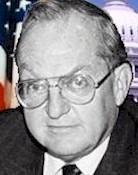Re: The E-SIGN Act, pertaining to the acceptance of electronic signatures.
Hearing: House Courts and Intellectual Property Subcommittee mark up of HR 1714.
Date: October 7, 1999.

| Statements of Rep.
Howard Coble (R-NC). Re: The E-SIGN Act, pertaining to the acceptance of electronic signatures. Hearing: House Courts and Intellectual Property Subcommittee mark up of HR 1714. Date: October 7, 1999. |
 |
|
|
|
||
Statement regarding HR 1714 made at the commencement of the subcommittee's mark up of HR 1714.
Pursuant to notice, I call up the bill H.R. 1714, the 'Electronic Signatures in Global and National Commerce (E-SIGN) Act,' for purposes of markup.
Without objection, the bill will be considered as read and open for amendment at any point. I recognize myself for purposes of explaining the legislation.
H.R. 1714 attempts to facilitate the continued success of electronic commerce by ensuring that businesses and customers that contracts created with electronic signatures and electronic records are legally effective in the same way that paper contracts and records are today. I support that goal.
The use of the Internet to conduct business, or e-commerce, has exploded beyond prediction. However, this success could be hindered without some degree of uniformity among states regarding the legality of electronic signatures and records used in electronic commercial transactions. Currently, some states have adopted electronic signatures and records legislation and some have not. In an attempt to solve this problem, the National Conference of Commissioners on Uniform State Laws approved a model law, the "Uniform Electronic Transactions Act," and has recommended it to the states for adoption. This model law has widespread support by all parties. Yet, it will take at least 2 to 3 years for the majority of states to adopt it. Many in the e-commerce industry believe it is necessary to adopt federal legislation to "fill in the gap".
While I support the thrust of H.R. 1714, 1 believe that it imposes unacceptable preemption over state law-making processes, raising concerns regarding constitutional federalism. I also am concerned over tile effect of the bill on court rules on admissibility, retaining records for proof in litigation, and legal documentation. I am particularly concerned about provisions in H.R. 1714 which would allow the federal government to go to federal court to restrain a state from enforcing laws they enact. While private parties who have standing and are injured may challenge the enforcement of state laws that are inconsistent with federal laws where there is concurrent jurisdiction, allowing the federal government to have this role is unwise and could tip the balance of powers.
On September 30, the Subcommittee held a hearing on H.R. 1714. At that hearing, many of the witnesses voiced similar concerns with H.R. 1714. The Subcommittee explored the merits and deficiencies of both H.R. 1714 and S. 761, the Senate counterpart introduced by Senator Abraham. Based on the testimony presented at the hearing, I have drafted an Amendment in the Nature of a Substitute, which I intend to offer. It will alleviate my concerns about the adverse affects of H.R. 1714 while supporting the thrust and purpose of the bill. I urge the Subcommittee to report H.R. 1714 favorably to the full Committee.
Statement regarding Rep. Coble's amendment in the nature of a substitute to HR 1714.
I have an Amendment in the Nature of a Substitute at the desk, which, without objection will be considered as read.
I recognize myself for purposes of explaining the Amendment In the Nature of a Substitute.
The Amendment in the Nature of a Substitute to H.R. 1714 incorporates, in my opinion, the best elements of H.R. 1714, S. 761 and the UETA so as to preserve constitutionality, federal-state relations, rules on admissibility, retaining of records for proof in later litigation, and the effect on legal documentation while supporting the goals and thrust of the bill.
It adopts the approach of H.R. 761 as reported by the Senate Commerce Committee in regard to the issue of federal preemption. The federal "gap filler" will be just that, as soon as a state adopts the UETA, or another law that has the same effect, the federal preemption is no longer effective in that state. This is a more limited preemption and recognizes the jurisdiction of states in creating laws governing contracts.
it adds a section providing for retention of records in electronic format from the UETA.
It includes a list of specific exclusions from the federal preemption. These are areas of law where states may have a compelling interest in maintaining the necessity for them to be in paper form. They include things like private medical records, family law matters, wills, and health care decisions.
It applies to commercial transactions but does not include transactions where federal or state governments are a party. H.R. 1714 includes government transactions which are covered by the "Government Paper Elimination Act" enacted into law during the 105th Congress.
Finally, it includes title III from H.R. 1714 without change. This section amended the Securities and Exchange Act."